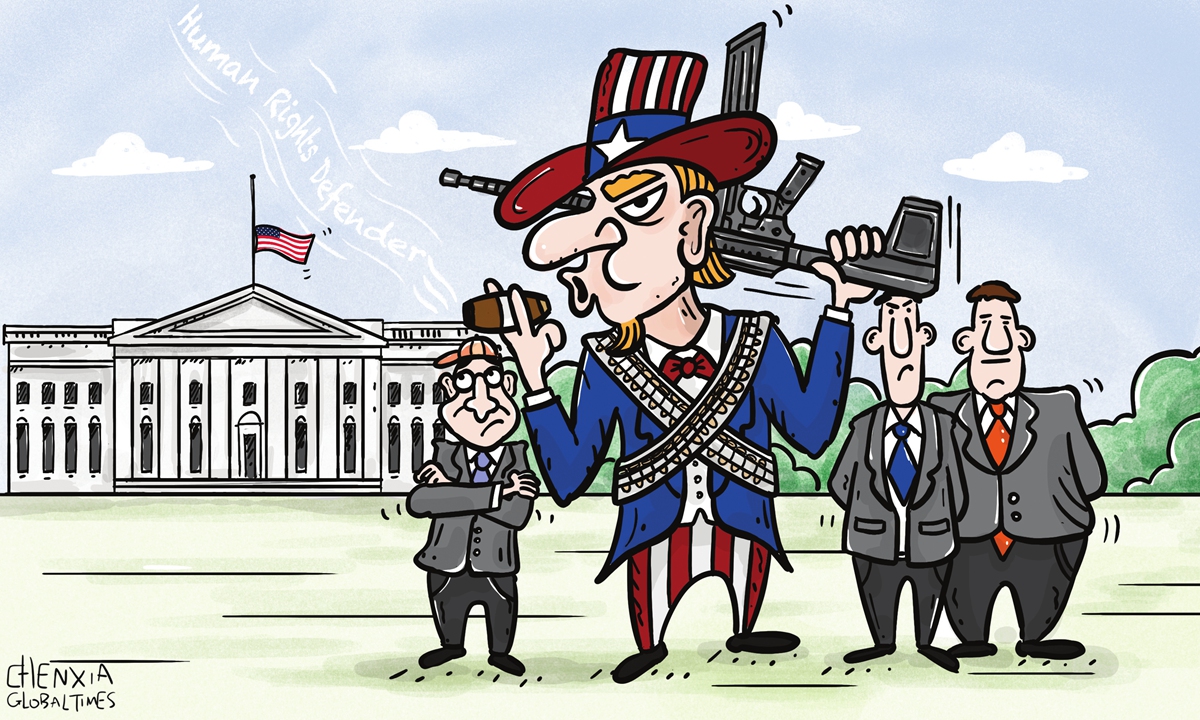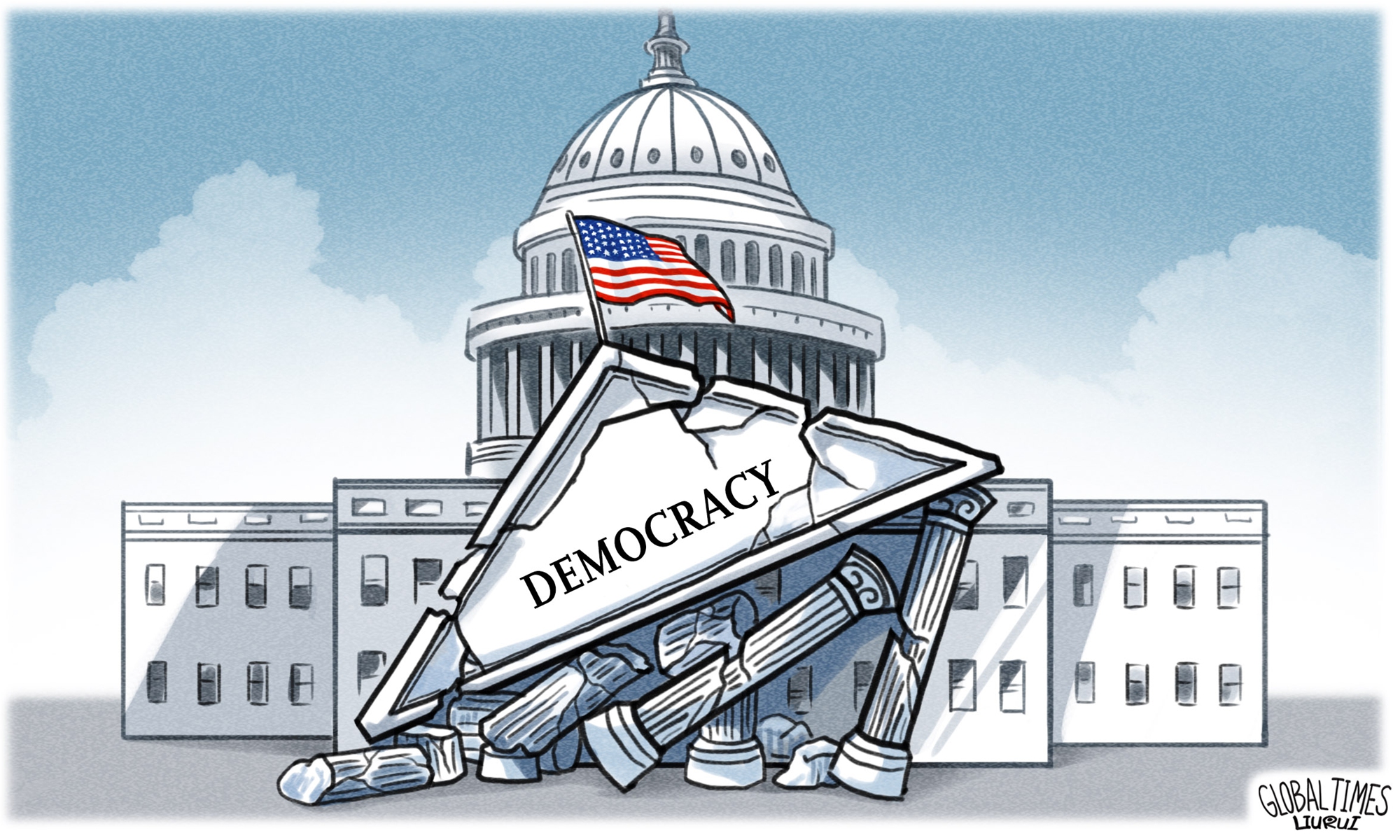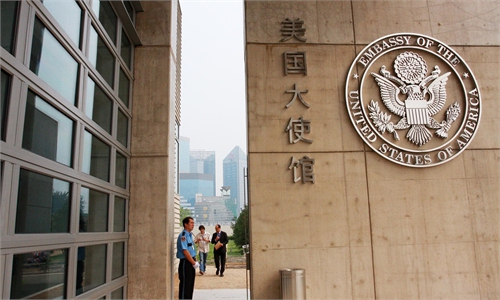US embassy increasingly offensive in pushing ‘peaceful evolution’ in China by roping in activists with money

Illustration: Chen Xia/GT
Recently, the US Embassy and consulates in China released its Mission China Public Affairs Section (PAS) Annual Program Statement on its website.
The program aims to support non-governmental organizations (NGOs) including think tanks, civil society organizations and individuals carrying out programs in support of the civil society, museums, national parks, nature reserves, and community organizations to carry out activities to spread American values and enhance the understanding of the US among the Chinese people, among other objectives. The maximum amount for each award is $30,000.
Li Haidong, a professor at the Institute of International Relations at China Foreign Affairs University, told the Global Times that this program is being initiated by the US State Department, under the guise of "public diplomacy" to propagate and infiltrate all parts of China, including Hong Kong and Macao, and provide funding and transfer benefits to "specified individuals" or "organizations" under the cover of cultural activities, and may even aim to instigate a "color revolution".
One of the priority program areas is "programs that amplify or otherwise provide a framework for US businesses to share American values, including but not limited to specific corporate social responsibility (CSR) activities in partnership [with] or within Chinese communities."
This is to use US companies as a tool to promote the American way of life and values in China, and the recipients of the grant will be able to experience the relevant methods in American enterprises, Li said.
Another area in the priority program areas is "Education, cultural exchange, and diversity and inclusion. These may include expanding access for persons with disabilities, women's empowerment, LGBTQI rights, and the preservation of minority cultures," it said.
According to Li, the program, looking from a literal point of view, seems to focus on human values, interests, and rights. But the problem is that topics including environmental protection, feminist rights and ethnic minority issues are highly politicized in the US. And the program also claimed that it does not support "Programs relating to partisan political activity." Their attempt to cover up something only makes the situation rather obvious, he said.
The program also states that it does not support charitable or developmental activities, which means the project is not for free, he added.
Li noted that there are two points which can be used by Americans that are worthy of attention. First, it is through what kind of procedures the program selects the recipients of the funding. The second is what happened to these people after receiving funding and participating in the program.
While the program tries to emphasize de-politicization, the program itself is run by a political organization - the US State Department- which gives people a lot of room for association. To put it bluntly, it is "selling dog meat as mutton," Li said.
It's hard not to be skeptical of the true intentions behind the US' "public diplomacy" program, Chinese Foreign Ministry spokesperson Zhao Lijian said on Wednesday.
There are reports that the US Senate Foreign Affairs Committee passed the Strategic Competition Act of 2021, which authorizes $300 million to be appropriated for each fiscal year to "counter the malign influence of the Chinese Communist Party globally," Zhao said.
Also, the US interferes in other countries' domestic affairs, exerts malicious influence and even provokes "color revolutions" under the pretext of democracy and human rights as exposed by international media organizations, he added.

Crumbling US democracy. Illustration: Liu Rui/GT
True face of US public diplomacy
While the program states that its funding is for projects that improve US-China relations and enhances understanding of the US among Chinese people, the problem is the "public diplomacy" promoted by the US does not serve this purpose, analysts have said.
The State Department states that "the mission of American public diplomacy is to support the achievement of US foreign policy goals and objectives, advance national interests, and enhance national security" by "informing and influencing foreign publics and by expanding and strengthening the relationship between the people and Government of the United States and citizens of the rest of the world."
It's not hard to find the practice of this public diplomacy on the social media accounts of the US Embassy in China and the website run by the Wild Geese team, which includes staff members of the US State Department.
Written in Chinese, the Wild Geese team blogs speak highly of the US and unrealistically elevate its image. It also tailored its content specifically for Chinese readers
In the "US Public Diplomacy toward China" thesis by Sean Zohar Keith from the Ohio State University, it cited the US propaganda machine Voice of America (VOA) as a typical successful example of US public diplomacy toward China
As we know, the VOA played an important role in the collapse of the former Soviet Union and was an important participant in the "color revolution" in East Europe. If it now plays an important part in US public diplomacy toward China, does it mean that the US public diplomacy toward China includes "color revolution?" experts questioned.
In the same paper, Keith also listed the achievements of US public diplomacy through interviewing some Chinese people who participated in these programs.
As Keith put it in the paper, most interviewees hold a very positive attitude toward the education and cultural exchange programs provided by the American government. Some said their impression toward the US gradually improved as they had a "misunderstanding" before coming to the US.
The interviewees said these education and cultural programs did not have brainwashing elements. Experts pointed out that such results had an underlying logic: It is incorrect to have negative opinions toward the US and the US programs toward China don't have the "brainwashing" element.
In the US Assistance Programs in China (2016) by Congressional Research Service, it had the description that some policymakers argue that "US assistance activities in China have helped to develop protections of some rights, build foundations for the rule of law and civil society, and bolster reform-minded officials in the PRC government."
It mentioned that since 2002, the International Narcotics Control and Law Enforcement account funding has supported a Resident Legal Advisor, based in the US Embassy in Beijing, to offer expertise on US criminal law and procedure to Chinese government officials, jurists, and academics, and to "promote long-term criminal justice reform in China."
Obviously, it wants judicial reform in China to be like that in the US, experts said.
It also listed the efforts of the US government and private organizations, such as the Dui Hua Foundation, which have reportedly helped achieve some progress in the area of criminal justice reform in China in recent years.
It's also noticeable that such practices permeated with the opinions of some American NGOs related to China.
Regarding the Rule of Law and environmental programs (Development Assistance and Economic Support Fund Accounts), between 2006 and 2011, Congress allocated Development Assistance account funds for rule of law and environmental efforts in China. These programs facilitated US engagement with China bar associations, provided Chinese students with legal training, and strove to enhance the capacity of Chinese law colleges and judicial institutions, and develop citizen awareness of the legal system.
Besides, the report mentioned that it provided $1 million from the ESF account to nongovernmental organizations based outside China that include those fostering democracy in China as their primary purpose, and for activities of NGOs located outside China to foster democracy in China.
In 2012, the conferees recommended $12 million from the ESF account go to US institutions of higher education and NGOs for democracy, governance, rule of law and environmental programs in China; an approved $7.5 million in ESF funds were to go to NGOs for activities that preserve cultural traditions and promote sustainable development and environmental conservation in the Tibetan Autonomous Region and other Tibetan communities in China.
The content in 2012 is similar to the content mentioned in the small grants program this time. The program this time also specially mentioned the Southwest China.
The report also mentioned that the US government provided $450,000 and $922,000 in the 2006 and 2010 fiscal years respectively, for programs to strengthen Hong Kong political parties.
US double standards
It's noteworthy that the US Consulate General in Hong Kong and Macao also lists small grant programs.
Analysts pointed out that in addition to directly propagandizing Western democracy and its rule of law, it often uses the guise of caring for women's, animal. and minority rights to export "color revolution."
However, what is behind the demand for "equality" is essentially incitement toward extremes.
For example, the National Endowment for Democracy likes to fund organizations promoting women's rights in China.
However, those NGOs don't really promote women's rights in China, but use a variety of social media platforms to promote extreme rumors like "China is the leading countries in the patriarchal violence" and "women are in a dark moment," to stoke familial, matrimonial, social, and political system hatred and even ignite a "revolution." Some have even colluded with Hong Kong and Xinjiang separatists.
While the US blatantly uses various methods to repurpose NGOs as tools and platforms for exporting American democratic and societal values and even instigating a "color revolution," at the same time, the US frequently slanders China's normal academic and cultural exchanges as infiltration, interventionist, and even espionage.
For example, as an institution that enhances people's understanding of the Chinese language and culture, Confucius Institutes have for many years upheld the purpose of abiding by the laws and regulations of host countries and have never participated in any activities related to the host countries' politics, religious affiliations, or racial discourse. Since the first Confucius Institute was founded in 2004, these institutes have had many achievements in improving China-US cultural exchanges.
However, as with the tension in China-US relations and the growing momentum of American conservatives, some politicians and think tanks have used absurd reasons to attack and smear Confucius Institutes. As a result, many universities have had to terminate their cooperation with Confucius Institutes.
In 2020, the then US Secretary of State, Mike Pompeo, described the Confucius Institutes as "foreign mission(s)" and smeared them as "an entity advancing Beijing's global propaganda and malignant influence."
In addition to Confucius Institutes, the US has also used various methods to pressure journalists from Chinese news agencies in the US.
Last year, the US designated 15 Chinese media outlets in the US as foreign missions and expelled more than 60 Chinese journalists. It also slashed Chinese journalists' visa terms to a maximum of three months.
The Chinese Foreign Ministry spokesperson Hua Chunying told a press conference recently that two Chinese journalists who had applied for visa extensions last November have still not been approved. So they had to stop working this February. When one journalist was forced to return to China on May 1, he was interrogated unusually by US border agents, and his laptop among other electronic devices was checked.
Experts said that on the one hand, the US calls its own infiltration activities into other countries "freedom," while on the other hand, it slanders normal news reports and cultural exchanges of other countries as "infiltration." This is a hypocritical double standard, and it is also a manifestation of America's weakness.
Way of 'peaceful revolution'
Wang Qiang, a research fellow at the National Defence University, told the Global Times that different from cultural exchanges and international communication activities in the general sense, the small grants programs in public diplomacy are an offensive diplomatic strategy. Their funding targets young people who are more receptive to American values.
They are regarded by the US government as a pawn for the target country and society to promote American values in the future. As long as they can influence young people, they can help promote American thought and cultural norms in target countries in the long run. After all, this is a way to a "peaceful revolution," he said.
Based on his observation, after 2005, the foreign public diplomacy of the US showed obvious signs of shifting from defense to offense. With the active and normalized topic setting, it selected topics such as science and education, environmental protection, women, and cultural tolerance among others, which are not sensitive on the surface, but are topics that young people tend to care about. They avoid topics such as religion and politics that tend to encourage opposition, and subtly provoke opposition between the target country's society and government.
Recently, the US Embassy in China hosted the "Art for the People" graffiti project.
Wang said that the US encourages young graffiti lovers to "exhibit their individuality" in this way. Behind it is an attempt to bring young people into topics and content generated by the US. If the government of the target country intervenes, such activities could easily be transformed into an antagonistic relationship between the US government and the government of the target country, and the graffiti lovers.
Another example is the issue of animal protection and the protection of women's rights. They all use public goodwill , such as equality, sympathy for the weak, caring for small animals, respecting life, among others, to consciously create topics to guide public opinion in direct opposition to the official stances of target countries. They deliberately elevated the survival of animals above human rights, misinterpreted the equality of men and women as the so-called equal rights of men and women.
The concepts of animal protection and women's rights promoted by the US are incompatible with the culture and history of the target country, but are the concepts that the US actively creates for the target country. Through long-term strategic operations and funding, the US provokes the opposition between society and the government.
The public diplomacy small grants program showed that the US Senate's Strategic Competition Act of 2021 orders that from 2022 to 2026, there should be an annual $300 million to counter China's "malignant" influence around the world, Shen Yi, a professor at Fudan University in Shanghai, told the Global Times.
The manipulation of using the $300 million to foster anti-system influencers and activists inside China is some of the so-called public diplomacy programs by US embassies.
From the program, it can be noticed that the US government has leaned into its hypocrisy as always. For instance, it states the program that supports enhancing China-US relations, especially Chinese people's understanding toward the US - in another word, it means that Chinese people do not understand the US, and the information Chinese people have accepted about the US is not what the US government wishes for Chinese people to have.
A most direct way that the US can think of to promote "peaceful evolution" has been changed from "the call of value" to "sprinkling dog food" with money.
Shen said that you could imagine how the US would react if the Chinese Embassy in the US posted a similar announcement on its official website.
He reminded the US to think about the different performances of China and the US on a series of issues, including the anti-pandemic response and international cooperation. Are these differences really because the US government has not been using enough inducements in exporting its American values?
"Is it the fact that the international community was deceived by 'fake news' because it didn't know what was happening, or the US itself is facing many problems but continues fanning flames instead of taking a look at itself?" Shen said.

